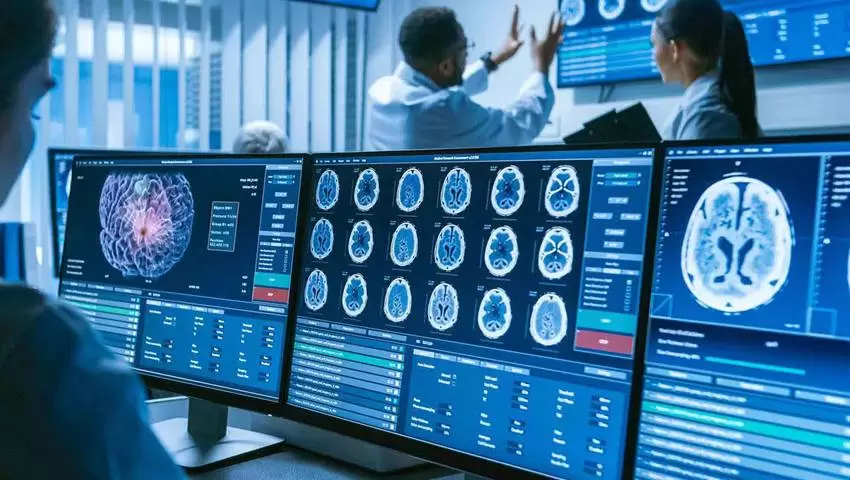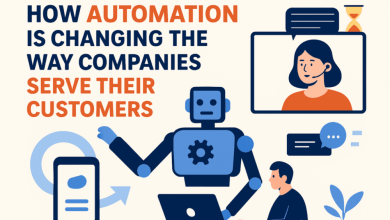AI in Healthcare: Transforming Medicine with Advanced Technology

Introduction
Present-day society no longer considers Artificial Intelligence (AI) a mere buzzword. This emerging technology rapidly changes industry operations, including healthcare, where transformation reaches its greatest impact. AI in healthcare systems continues to transform medical diagnosis processes and treatment delivery, thus resulting in enhanced patient outcomes. Medical professionals who work with AI engineers have collaborated with this paper to demonstrate how AI brings innovative changes to medicine that combine efficiency improvements and personalized care delivery.
What is AI in Healthcare?
AI in healthcare combines machine learning programs, natural language processing technologies, and data analytical tools to process sophisticated medical information like the human mind does. The technology helps computers swiftly handle large volumes of data with precision to assist medical practitioners’ decision-making.
The World Health Organization states AI technology increases health service benefits through precise diagnostic systems, which direct medicine resources and create prevention-oriented treatments.
The application of artificial intelligence transforms medical diagnostic practices.
The application of AI shows its most substantial influence in medical diagnosis systems. The diagnostic systems currently in place require inefficient and error-prone operational methods. Since AI has entered the medical field, human health diagnoses have benefited from improved accuracy rates and accelerated results processing.
Radiology and Imaging
Using artificial intelligence technology, medical specialists can identify medical abnormalities in X-ray and MRI, and CT scan results with exceptional accuracy. DeepMind, under Google’s research division, developed an AI system which proved superior to human radiologists in breast cancer detection from mammograms.
Pathology
Digital pathology slides undergo AI algorithm processing, which helps pathologists detect cancer cells, besides forecasting tumor development rates and providing precise diagnosis assistance.
Predictive Diagnostics
Machine learning models identify disease risks through the evaluation of patient records and hereditary information, and life habits. The predictive tools enable an early opportunity for intervention, which leads to superior disease management strategies.
AI technologies deliver improved healthcare services together with individualized treatment solutions.
AI uses identify personalized medicine as one of its most useful healthcare applications. Analysis of patient data by AI systems lets them create treatment plans suited to specific genetic profiles for better results.
Treatment Recommendations
AI uses assessment of medical data from past patients to generate custom treatment solutions based on existing case outcomes. Cancer patients can receive evidence-based treatment suggestions through IBM Watson for Oncology, which uses AI to evaluate patient data sets.
Virtual Health Assistants
Healthcare providers benefit from artificial intelligence devices, which allow patients to manage their chronic conditions while making medical bookings and accessing healthcare resources through virtual platforms. Through this tool, medical operations show enhanced patient interaction while healthcare providers experience less workload.
Robotic Surgery
The use of AI-based robotic systems delivers improved precision control features to surgeons. These systems both reduce medical complications and accelerate healing periods while resulting in better surgical results.
AI in Healthcare Industry: Operational Efficiency and Cost Reduction
AI technologies in healthcare production systems bring operational efficiency to health institutions throughout the sector. Operational refinements in healthcare institutions receive substantial benefits from AI through its application for administrative processes and resource optimization.
Streamlining Administrative Tasks
AI systems can implement computerized systems that automatically perform work such as billing and coding, and create documentation. Medical note transcription through natural language processing tools makes doctors spend more time on patient care by decreasing the need for human clerical work and reducing errors.
Resource Allocation
AI technology uses predictions to anticipate upcoming patient numbers, which in turn helps staff scheduling as it controls bed distribution across facilities. The healthcare tools enable hospitals to maintain stability during times of increased patient demands, particularly when facing public health emergencies.
Supply Chain Management
Through AI technology, hospitals can track their inventory supply and predict customer requirements while lowering wastefulness. The system lets healthcare institutions maintain the required medical supplies at moments of need.
Challenges and Ethical Considerations in AI Adoption
The implementation of AI in healthcare services brings advantages but presents new obstacles, together with moral problems.
Data Privacy and Security
The AI in the healthcare industry handles sensitive information, for which regulators enforce strict policies. Data privacy needs protection when organizations use AI systems. Medical researchers use federated learning and blockchain systems to safeguard patient healthcare records.
Bias and Fairness
AI models retain discrimination when using biased dataset information to make healthcare decisions. Algorithms and diverse datasets must be included throughout the development phase to minimize bias patterns.
Regulatory Compliance
Every AI system needs to fulfill regulatory requirements as a condition for market entry. The safety and effectiveness of AI tools are being developed by the FDA together with other international regulatory bodies.
Future of AI in Healthcare
Healthcare AI shows promise since new developments persist in this field. AI has extensive applications in healthcare that include drug discovery, along with remote patient monitoring.
AI and Genomics
The increase in genomic research occurs because AI systems identify genetic mutations at the core of diseases. The research advances the path toward advanced therapies for genes as well as precise medical treatments.
Remote Monitoring and Telemedicine
Wearable devices connected to AI algorithms let physicians check their patients’ statuses from a distance while AI systems indicate when immediate medical help is required. This system delivers valuable support in managing patients affected by persistent chronic diseases.
Drug Discovery and Development
The development of AI shortens the drug discovery period while decreasing its manufacturing costs. The organizations BenevolentAI and Atomwise speed up drug candidate identification through their implementation of artificial intelligence technology.
The healthcare industry will see more advanced AI systems unite various capabilities to deliver complete care solutions as AI technology advances.
AI in Healthcare Around the World
Healthcare adoption of AI technology progresses at different rates across nations because of their combined technology capacity and government backing.
United States
The U.S. leads in AI healthcare startups and academic research. The Mayo Clinic, together with Stanford University, leads the development of AI applications for clinical practice.
United Kingdom
Multiple AI pilot programs function under the UK National Health Service (NHS) to improve medical diagnostics and patient assessment systems.
China and India
These nations are using AI technology to eliminate healthcare access challenges by focusing on rural areas. The healthcare sectors utilize AI tools that perform disease screenings and provide mobile health support and diagnostic functions.
Frequently Asked Questions (FAQs)
AI defines different healthcare applications through which it operates.
The healthcare sector utilizes Artificial Intelligence systems for diagnosis and treatment strategy design, as well as to provide virtual medical help and perform robotic surgeries and automate administrative tasks, and develop pharmaceutical products.
Is AI replacing doctors?
AI technology functions as a tool that supports medical staff in their work instead of taking their position. Through its implementation, AI enables healthcare practitioners to make decisions using improved data sources.
Where does Artificial Intelligence stand in its development toward medical applications?
The healthcare sector of the future will deliver individualized medicine through AI while employing remote tracking and speeding up medication development, and connecting entire health services using AI technology.
Are AI healthcare tools safe?
AI tools exhibit safety effectiveness when they undergo proper validation and regulatory checks. Gasping oversight and devoted tests serve as critical foundations for securing healthcare systems.
Through which mechanisms does AI enhance patient results?
Treatment optimization through AI technology, along with improved diagnosis precision, together with accident reduction and proper timing of intervention,s leads to better healthcare results for patients.
Conclusion
Medical practice receives a transformative effect from AI-powered healthcare that delivers enhanced medical efficiency alongside improved accuracy and personalized medical care. The AI in healthcare industry benefits from AI technologies that allow medical providers to achieve improved clinical results throughout all aspects of patient care. To advance successfully, healthcare organizations must employ ethical moderation and strong data-management systems and maintain the ongoing partnership between medical experts and developers. AI in healthcare with bright prospects for creating smarter, responsive, patient-oriented healthcare systems that will shape the coming years.




